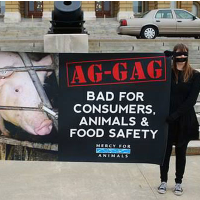Four Charged with Violating Utah’s “Ag-Gag” Law
 (photo: Mercy for Animals)
(photo: Mercy for Animals)
Four Californians stopped in Utah for taking pictures of agricultural buildings last September are apparently the first non-residents to be charged with violating the state’s controversial “ag-gag” law.
It has been against the law in Utah since 2012 to photograph agricultural operations, including the mistreatment of animals. Utah and a half a dozen other states have enacted laws to crack down on animal rights activists and others who have documented cruel and unsanitary conditions around the country.
The four, members of the Farm Animal Rights Movement (FARM), were each charged with one count of misdemeanor criminal trespass on agricultural land and agricultural operation interference, according to the Salt Lake City Tribune. They said they were aware of the ag-gag law and were filming a documentary tracing pigs’ journey from Utah to a Los Angeles slaughterhouse.
Sarah Jane Hardt, one of the defendants, told the Tribune they planned to legally record events at the Circle Four pig farm from vantage points on public property, not surreptitiously. But someone ratted them out and deputies handed them citations. The other three charged are Robert Penney, Harold Weiss and Bryan Monell. Circle Four is owned by a Chinese company, the Shuanghui Group.
A lawsuit (pdf) challenging the statute as unconstitutional was filed in July 2013 by the Animal Legal Defense Fund, People for the Ethical Treatment of Animals (PETA) and others. One of the plaintiffs, Amy Meyer, was arrested five months earlier after she used her cellphone to record images while on private property next to a slaughterhouse.
One of the pictures was of a sick cow being pushed by a bulldozer. The charge against her was dismissed after three months. Will Potter at Green Is the New Red says that the two Utah cases are the only ag-gag enforcements, nationally.
The Utah law defines four activities that are used by whistleblowers to uncover illegal behavior as, themselves, illegal: recording an image or sound without the operator’s permission; gaining “access to an agricultural operation under false pretenses;” asking for a job at a place for the purpose of making recordings; and making a recording while trespassing.
The lawsuit says the statute threatens groups like PETA as well as the investigators and whistleblowers they support:
“These statutes have the effect of criminalizing undercover investigative activities targeting agricultural operations, as well as the planning and assistance of such activity, thereby making the investigations and the journalism surrounding such events virtually impossible.”
The format for Utah’s ag-gag law was drafted in 2002 by the American Legislative Exchange Council (ALEC), a corporate-funded conservative political organization that brings lawmakers and lobbyists together to draw up model legislation that can be adopted in multiple venues.
-Ken Broder
To Learn More:
California Activists Charged under Utah’s "Ag-Gag" Law for Photographing Pig Farm (by Jessica Miller, Salt Lake Tribune)
4 People Prosecuted Under #AgGag Law for Photographing Factory Farm from the Road (by Will Potter, Green Is the New Red)
Judge Won't Toss Suit Challenging Utah's “Ag Gag” Law (by Marissa Lang The Salt Lake Tribune)
An Overview of “Ag-Gag” Laws (by Jeff Zalesin, Reporters Committee for Freedom of the Press)
Animal Rights Groups Sue Utah over Law Criminalizing Undercover Photography of Farm Abuse (by Matt Bewig, AllGov)
Animal Legal Defense Fund, et al v. Governor Gary R. Herbert and Attorney General Josh Swallow (U.S. District Court District of Utah Central Division) (pdf)
- Top Stories
- Unusual News
- Where is the Money Going?
- Controversies
- U.S. and the World
- Appointments and Resignations
- Latest News
- Trump to Stop Deportations If…
- Trump Denounces World Series
- What If China Invaded the United States?
- Donald Trump Has a Mental Health Problem and It Has a Name
- Trump Goes on Renaming Frenzy






Comments